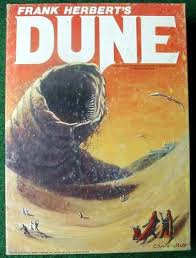The Science Fiction masterpiece written by Frank Herbert was largely based on the Bedouin and Arab cultures throughout the Middle East and the extractive political economics that drive conflict today. For those of you unfamiliar with the story here is a brief description….
On the desert planet Arrakis, there is a very precious commodity called the Spice. This commodity is only found on the inhospitable planet and is necessary for interstellar travel. The intergalatic trade guild, CHOAM, requires it and uses a baron from another planet to extract it. There are two warring families the Atreides and the Harrokens, both competing for the rights to the spice and the native inhabitants are the Fremen, tribal nomads who have learned to survive the harsh environment. The Emperor sides with the Harrokens, Paul Atreides father dies and Paul is exiled, where he allies with the Fremen. From there they wage war and Paul eventually becomes their just ruler.
It borrows much from Islam such as Hajj and Jihad (the Bulterian Jihad against sentient machines) and Paul Atriedes character is clearly modeled after desert prophets like Jesus, Moses and Muhammad. Furthermore off shoots of of Islam develop including Zensunni and Zenshia which are hybrids of Zen Buddhism Sunni Islam and Shia Isalm respectively.
The Arab language is very prevalent throughout the book, such as the Aba, a loose robe worn by the Fremen and is typically black, can be loosely translated to the Abaya, the traditional female dress for centuries. Some have argued that the word Arrakis, the planet of Dune is derived from the Arabic word Raqs meaning to dance, however this is only true in some dialects and seems to be a remote possibility.
From a economic development stand point, Dune represents an excellent example of extractive economics. While the spice is a valued commodity and arguably the most important export in the galaxy as it is required for travel, the Arrakis natives remain improvised. The largest threat to their lives seems to be a lack of water, something that could be easily traded for given the balance of trade. All technology on Arrakis had been built around saving water, even the dead were drained and their fluids given back to the tribe. They are shocked to hear that Paul comes from a planet where water falls from the sky into giant pools of water that surround land. A student of economics would ask why something that has low demand in once place, Paul’s planet, and has such a high demand in another is not being traded? Why is it that people with access to such an amazing natural resource like spice, are deprived of something that could be traded so cheaply?
The answer comes down to good governance and self rule something James Robinson and Daron Acemoglu discuss here. By establishing extractive institutions such as the Baron or Western Oil companies, you have stymied development and laid the ground work for corrupt governments. The Fremen are unable to capitalize on the trade imbalance simply because they are not governing themselves, the trade guild governs them with no interest in building an economy only extracting a commodity. This is similar to economics of Egypt under Hosni Mubarak who was supported by western powers for decades while the economic opportunities of the Egyptian people crumbled.
Some would argue that the spice lead to a paradox of plenty, or a resource curse where natural resources are more of a curse than a blessing to a nation’s economy. Primarily OPEC countries are used to make this argument by comparing their GDP with their vast resources in oil, but little is taken into account of the extractive institutions that plagued the region for many years. Without examining institutions that govern whether it be interstellar empires, western oil companies, or corrupt governments we cannot understand the struggles of people today.
Whether Frank Herbert foresaw the debates of transparency or the political uprisings in the Middle East today, we will never know as he is dead. However, Dune remains one of the best examples of Arab culture and political economy in Science Fiction today.



